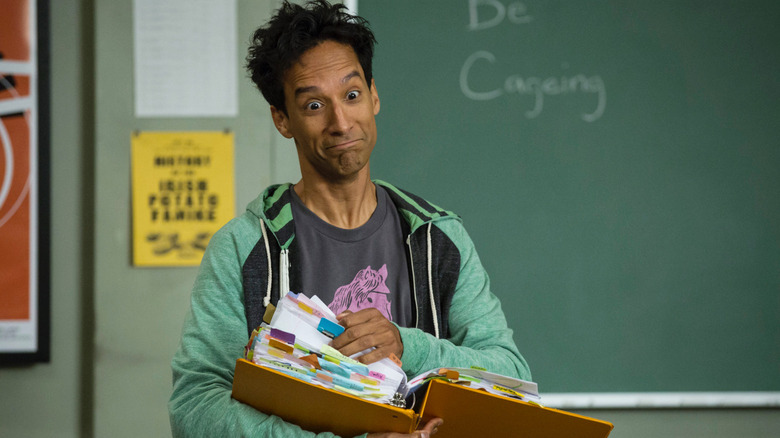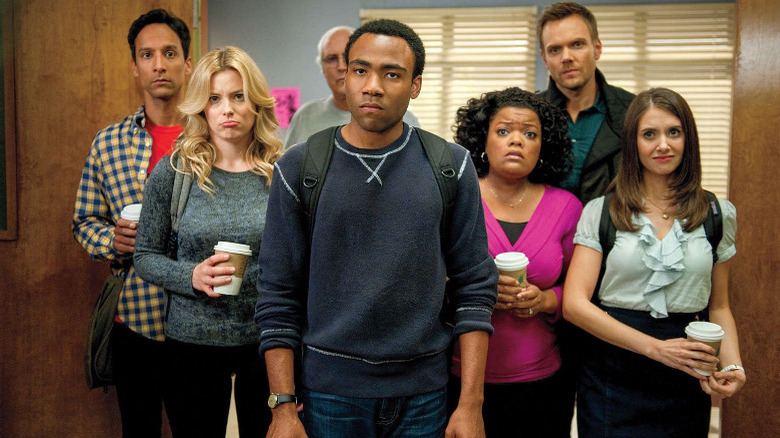How Dan Harmon's Own Community College Experience Influenced Community
Going to college can be a surreal experience. It's a place where you're suddenly exposed to ideas and points-of-view you've never encountered before, surrounded by people of all walks of life. If you jump to college right out of high school, it also means going through all this when you've only just become a "real" adult and are scrambling to figure out what that even means (much less how to "adult" well).
Dan Harmon's "Community" very much captures that sense of surreality. The series began as a relatively grounded, albeit comedic, take on community college life centering on an eclectic group of students who form a tight-knit, quasi-functional study group. The further it went along, the more the show embraced meta-humor, delivering self-aware riffs on popular tropes in film and TV, high-concept episodes parodying everything from "Law & Order" to Ken Burns documentaries, and pop culture homages galore. It even went so far as to look at the ways college friendships can become toxic or harmful to people's growth as individuals. That it was able to tackle these topics with both sincerity and zany humor (like an episode where a game of "The Floor Is Lava" warps into a "Mad Max"-style battle for dominance) is a testament to the skills of its creatives.
Far from perfect, "Community" has its share of problems. Be it off-screen drama that affected the show's quality (gas leak year, anyone?) or that all-too-common issue on TV where characters that started out as three-dimensional people slowly became caricatures of who they once were, the series is as flawed yet lovable as its leads (most of them, anyway). In the end, it all goes back to Harmon, who drew inspiration from his own community college experience for the show.
'I've been really distorted in my view of the universe'
Nearly 15 years before "Community" kicked off its first of six seasons (and a movie?) in 2009, Dan Harmon got his start as a member of the Milwaukee improv comedy group ComedySportz. He would go on to co-write the well-reviewed 2006 animated horror-comedy movie "Monster House" and co-create "The Sarah Silverman Program" in 2007, prior to selling "Community" to NBC. When the series hit Netflix in 2020, it gave Harmon a chance to reflect on its origins and the way it was inspired by his own real-life experiences as a student at Glendale Community College in California.
Here's what he told the Independent for its oral history of "Community:"
"I knew it was a different idea for a pilot even before I wrote it. The thing I learned at community college is that I had my head up my ass, and I think that was related to the fact I considered myself this unappreciated TV writer. I ended up in this cramped study room with these total strangers. It was halfway through this study session that I was like, 'Oh my God, I really care if these people pass their biology test.' I had this warm feeling come over me. The two thoughts I had were: I've been really distorted in my view of the universe, and this is the kind of pilot networks are always wishing I would write."
Harmon's blunt honesty here has become one of his trademarks as a writer since he rocketed to fame post-"Community." It's been far from a smooth journey, though. Harmon is notorious for putting his foot in his mouth, having often used social media or his comedy podcast Harmontown (which he co-hosted with comedian Jeff B. Davis from 2012 to 2019) to issue public apologies for his words. He similarly used the podcast to address the sexual misconduct allegations made against him by former "Community" writer-producer Megan Ganz, issuing a lengthy apology that resulted in Ganz publicly forgiving him. She later told the New York Times it left her feeling "vindicated to others but, more importantly, to myself."
In a sense, Harmon's willingness to fully admit when he's done wrong and try to do better (without hiding behind excuses) makes him a lot like the unlikely heroes of "Community." It seems he may have learned something useful in community college after all.

